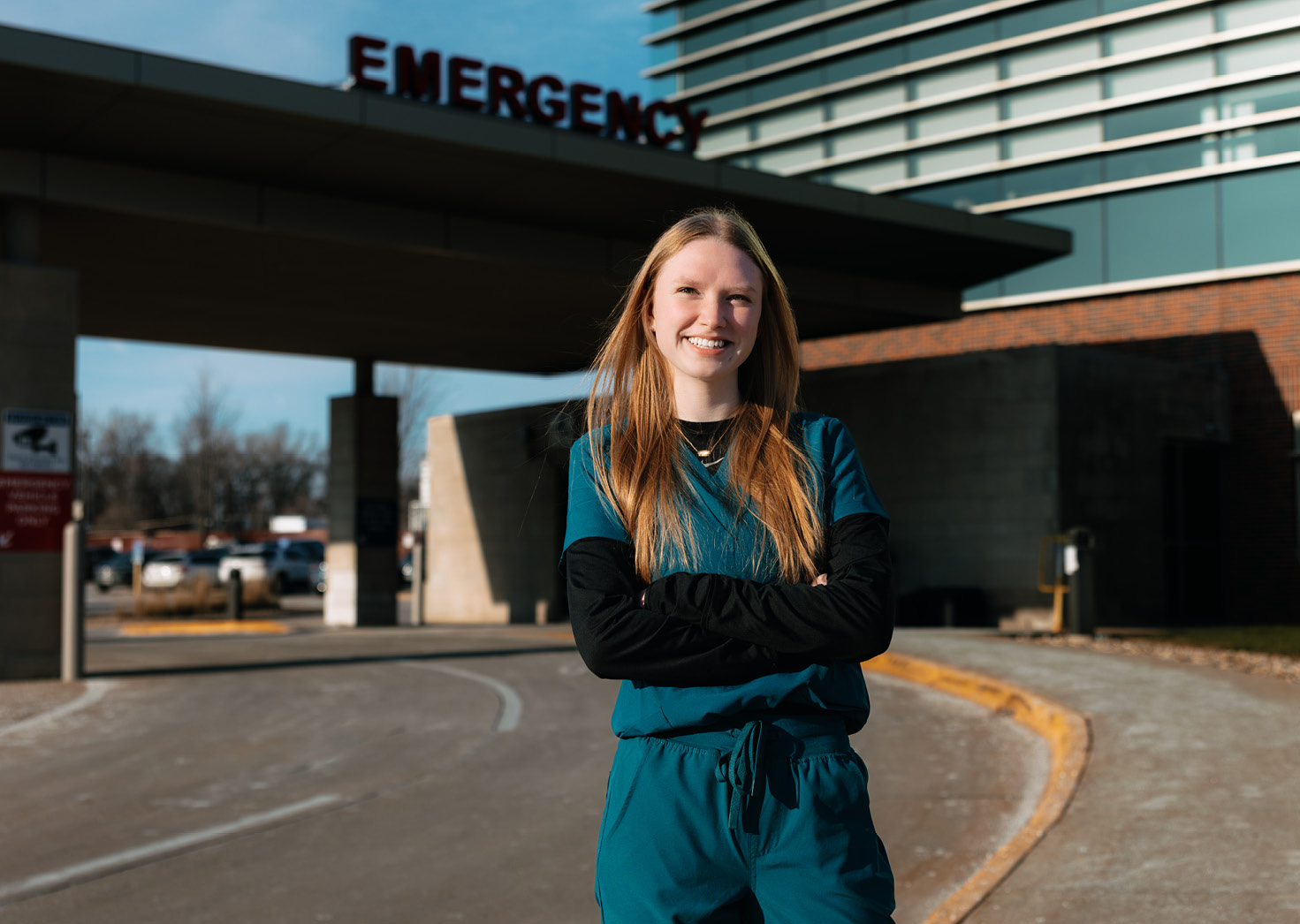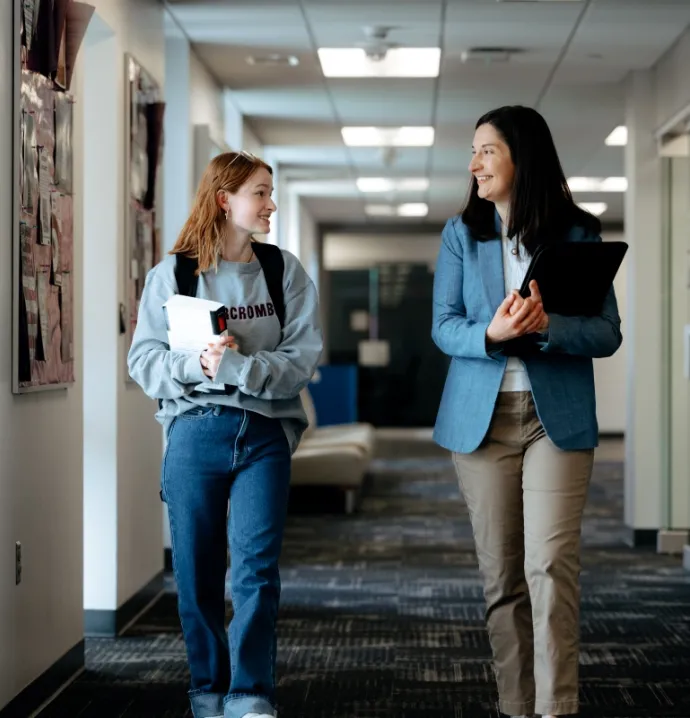Finding the right fit
Finding the right fit
Every day last fall, when Elle Greiner walked into Orchard Hill Elementary School, she was welcomed enthusiastically with a chorus of “Hi, Miss Elle!”
These greetings came from students in kindergarten through sixth grade — students with whom she spent an entire semester with during her internship shadowing elementary school counselor Kelly Moeller, ’13.
 Greiner’s internship was part of the psychology department’s volunteer and internship program, designed to give students opportunities to apply their psychology knowledge in real-world settings while deepening their understanding of the field.
Greiner’s internship was part of the psychology department’s volunteer and internship program, designed to give students opportunities to apply their psychology knowledge in real-world settings while deepening their understanding of the field.
“I was at a point in my education where I realized I wanted to work with kids but also combine my fascination with psychology,” says Greiner, a senior psychology major. “That led me to explore a few different paths, but I ultimately chose school counseling because of the consistency it provides for kids. I was eager to gain field experience and picked Orchard Hill on the recommendation of Psychology Internship Coordinator, Carolyn Hildebrandt. Thankfully, I had a wonderful experience, and I owe that to Kelly.”
During her internship, Greiner observed lessons on social-emotional topics such as bullying, managing anxiety and developing a growth mindset. She built relationships with students by eating lunch with them, playing games and participating in Moeller’s lessons through demonstrations and book readings.
These relationships became the most meaningful part of her internship.
“I finally feel like I have a purpose. It reminds me why I stay up late studying, why I go to class, why I ask questions.”
“My purpose is to build relationships, help shape mindsets and teach resilience to elementary school children. This internship gave me a reason to keep working hard in my studies and solidified my career path.”
Greiner’s experience exemplifies why the psychology department’s volunteer and internship program exists. Hildebrandt emphasizes that these opportunities take students beyond the classroom and into the field, where they gain hands-on experience.
“Although it is important to learn about psychology in the classroom, both from theoretical and research perspectives, it is also important to see how psychology applies to real-world situations,” Hildebrandt says. “Community placements allow students to see real-world examples of the complexity and richness of human experience.”
For students looking into careers related to psychology, volunteer opportunities and internships can be especially invaluable as they help students explore various fields.
“In my experience, students who have some practical experience in psychology before graduate school get the most out of their graduate education,” Hildebrandt says.
That will certainly hold true for Greiner, whose internship at Orchard Hill Elementary confirmed her goal of becoming a school counselor. After graduating this spring with a psychology degree and minors in mental health and family studies, she plans to pursue a Master of Arts in School Counseling — hopefully at UNI.
Psychology students have access to a wide range of internships beyond school counseling, and have interned at hospitals, clinics, hospices, assisted living centers and summer camps.
Nonprofit organizations such as Friends of the Family, Riverview Center, Waypoint Services, Pathways Behavioral Services, House of Hope and various crisis hotlines also regularly welcome UNI interns and volunteers.
Essentially, any career involving human interaction can help psychology students refine their skills and apply their knowledge.
 Senior psychology major Emma Mozena gained hands-on experience at UnityPoint Allen Hospital, where she worked as a safety/behavioral health technician and behavioral health specialist. In her role, Mozena spent one-on-one time with patients, providing support and ensuring their comfort.
Senior psychology major Emma Mozena gained hands-on experience at UnityPoint Allen Hospital, where she worked as a safety/behavioral health technician and behavioral health specialist. In her role, Mozena spent one-on-one time with patients, providing support and ensuring their comfort.
“Some patients just needed someone to talk to and listen to them, and I was able to do that,” she says. “Working at UnityPoint has given me a better understanding of why individuals act and react the way they do in unfamiliar environments.”
Mozena also learned how to tailor communication strategies for psychiatric patients. For instance, patients with psychosis may need help staying grounded in reality during agitation, those recovering from substance use may require extra physical care and reassurance, and individuals with major depression often benefit from emotional connection and conversations that help shift their outlook on life.
“These are just a few examples of what I’ve encountered,” Mozena says. “But they all share one thing in common: they provided me with hands-on experiences that will better help me problem-solve for my future patients and approach their needs.”
Like Greiner, Mozena’s internship helped define her career goals and reaffirmed that she’s on the right path.
After graduation, she plans to work in health care, specializing in patient-centered psychiatric care.
Both Greiner and Mozena’s experiences highlight that internships aren’t just about career discovery — they’re also about skill-building and professional development.
Psychology students can earn course credit for their work through the Cooperative Education Program, which counts as an elective in the psychology curriculum. As part of the course, students complete 50 field hours per credit, meet regularly with Hildebrandt and write a term paper. They also have the opportunity to present their experiences at the INSPIRE Student Research and Engagement Conference in the spring.
Additionally, students can earn course credit for leadership roles in organizations such as Dance Marathon, CATS and the Spectrum Project. In the past, students have received credit for teaching swimming to children with special needs at the Wellness/Recreation Center, tutoring at Rod Library and working as resident assistants in the dorms.
This is all because the psychology department is dedicated to helping students maximize their education through real-world experiences. And when it comes to the impact of internships, the results speak for themselves.
“I hear from employers and supervisors regularly,” Hildebrandt says. “In fact, every student in my class receives an evaluation from their field supervisor. Supervisors appreciate working with UNI students because of their strong work ethic, academic preparation and eagerness to learn.”
For busy professionals, student interns provide valuable support, allowing them to focus on their most pressing responsibilities. School counselors, in particular, recognize the benefits of working with UNI interns.
“In fact, after having her first undergraduate volunteer from UNI, one school counselor said, ‘I don’t know why I didn’t do this before,’” Hildebrandt shares.
Encouraging hands-on experiences like the meaningful internships Greiner and Mozena had showcases how the College of Social and Behavioral Sciences — and UNI in general — goes above and beyond to ensure students gain the knowledge, skills and confidence needed to find and pursue the right career path.




